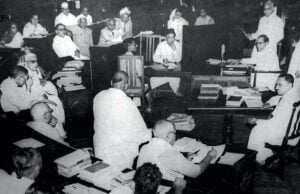Legislative Councils in provincial assemblies in British India were upper houses of the legislature. They were less powerful than the lower houses, but they still played an important role in the legislative process.
Legislative councils were first established in British India under the Indian Councils Act, 1861. The councils were initially composed of a mix of elected and appointed members, but the proportion of elected members gradually increased over time.
The Government of India Act, 1919 expanded the powers of the Provincial Legislative Councils and gave them the power to legislate on a wider range of subjects. The councils also gained the power to vote on the provincial budget.

Constituent Assembly meeting | Credit: Wikimedia Commons
The Government of India Act, 1935 introduced a system of provincial autonomy in British India. The provinces were now given a great deal of autonomy to govern themselves, and the provincial legislative councils were given the power to pass laws on a wide range of subjects.
The legislative councils in provincial assemblies in British India played an important role in the Indian independence movement. They provided a platform for Indian leaders to voice their grievances and to demand reforms. The councils also helped to create a sense of national unity among the Indian people.
After India gained independence in 1947, the provincial legislative councils were renamed state legislative councils. The state legislative councils continue to play an important role in Indian democracy. They are responsible for making laws on a wide range of subjects, and they also have the power to hold the state government accountable.
Here are some of the key functions of the legislative councils in provincial assemblies in British India:
- To review and revise legislation passed by the lower house of the legislature.
- To provide a forum for debate and discussion on important issues.
- To represent the interests of different regions and communities.
- To hold the colonial government accountable.
- To protect the rights of minorities.
Legislative councils are an important part of many democratic systems of government. They play a vital role in ensuring that the legislative process is fair and balanced, and that the interests of all citizens are represented.
Continue to the next section: Houses of Provincial Assembly
